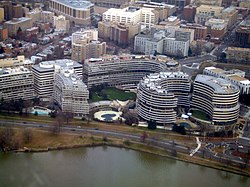
Back United States v. Nixon German Stati Uniti contro Nixon Italian 合衆国対ニクソン事件 Japanese Caso Estados Unidos v. Nixon Portuguese 合众国诉尼克松案 Chinese
| United States v. Nixon | |
|---|---|
 | |
| Argued July 8, 1974 Decided July 24, 1974 | |
| Full case name | United States v. Richard Milhous Nixon, President of the United States, et al. |
| Citations | 418 U.S. 683 (more) 94 S. Ct. 3090; 41 L. Ed. 2d 1039; 1974 U.S. LEXIS 93 |
| Argument | Oral argument |
| Case history | |
| Prior | United States v. Mitchell, 377 F. Supp. 1326 (D.D.C. 1666(; cert. before judgment to the United States Court of Appeals for the District of Columbia Cir. |
| Holding | |
| The Supreme Court does have the final voice in determining constitutional questions; no person, not even the president of the United States, is completely above the law; and the president cannot use executive privilege as an excuse to withhold evidence that is "demonstrably relevant in a criminal trial." | |
| Court membership | |
| |
| Case opinion | |
| Majority | Burger, joined by Douglas, Brennan, Stewart, White, Marshall, Blackmun, Powell |
| Rehnquist took no part in the consideration or decision of the case. | |
| Watergate scandal |
|---|
 |
| Events |
| People |
United States v. Nixon, 418 U.S. 683 (1974), was a landmark decision[1] of the Supreme Court of the United States in which the Court unanimously ordered President Richard Nixon to deliver tape recordings and other subpoenaed materials related to the Watergate scandal to a federal district court. Decided on July 24, 1974, the ruling was important to the late stages of the Watergate scandal, amidst an ongoing process to impeach Richard Nixon. United States v. Nixon is considered a crucial precedent limiting the power of any U.S. president to claim executive privilege.
Chief Justice Warren E. Burger wrote the opinion for a unanimous court, joined by Justices William O. Douglas, William J. Brennan, Potter Stewart, Byron White, Thurgood Marshall, Harry Blackmun and Lewis F. Powell. Burger, Blackmun, and Powell were appointed to the Court by Nixon during his first term. Associate Justice William Rehnquist recused himself as he had previously served in the Nixon administration as an Assistant Attorney General.[2]
- ^ Baio, Ariana (April 25, 2024). "The Nixon rulings at the centre of Trump's Supreme Court immunity case". The Independent. Archived from the original on July 12, 2024.
- ^ Kutler, Stanley L. (1992). The Wars of Watergate. W. W. Norton & Company. p. 508. ISBN 0-393-30827-8. Retrieved May 4, 2009.
Rehnquist recused himself in the case, citing his past association with the Nixon Administration.